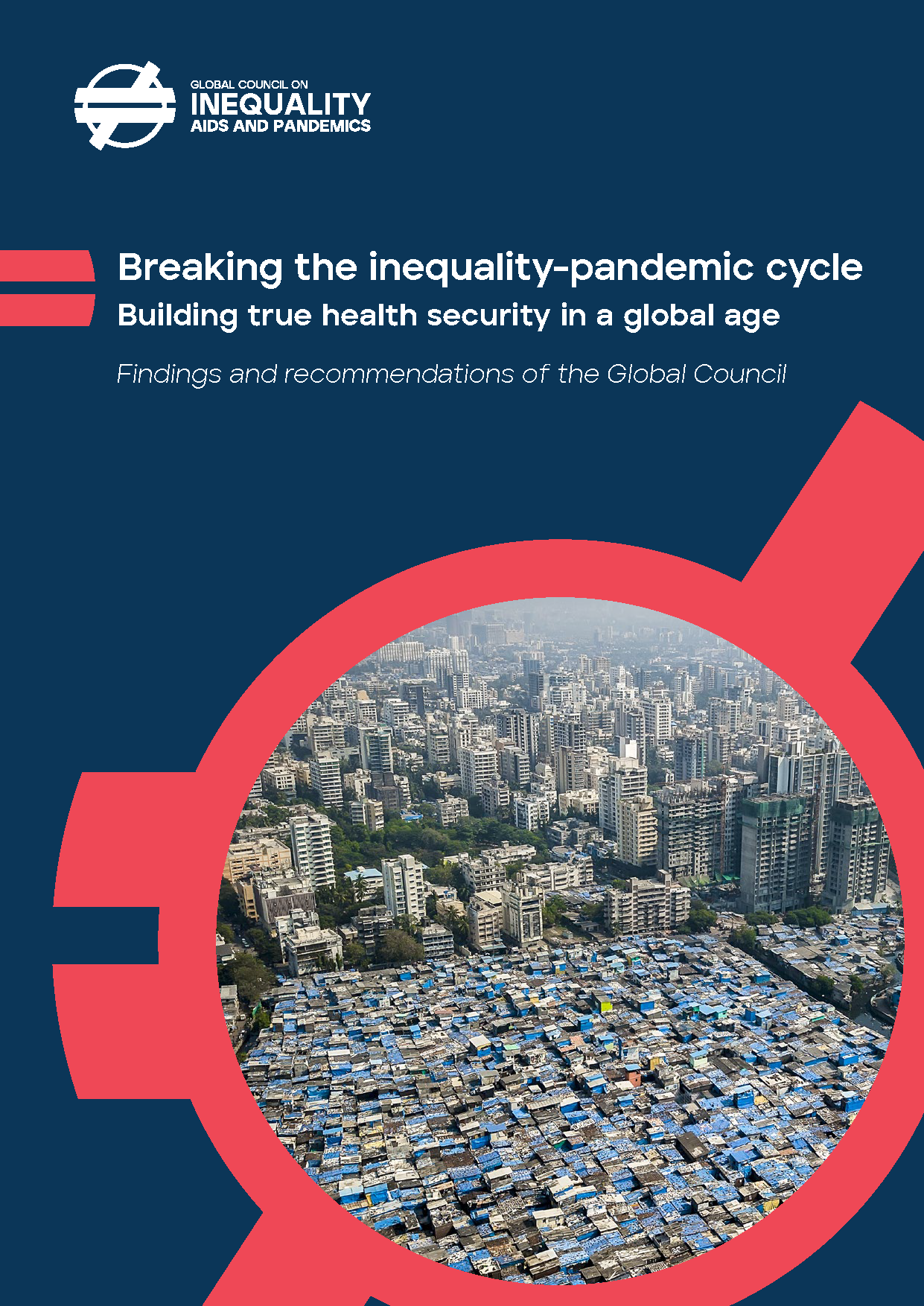
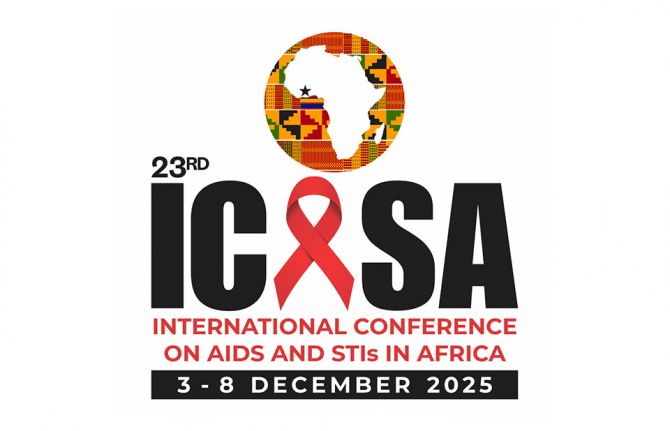
Media Advisory
UNAIDS is calling for the safeguarding of the global HIV response at the International Conference on AIDS and STIs in Africa (ICASA) in Ghana
02 December 2025 02 December 2025UNAIDS is participating in the 23rd International Conference on AIDS and STIs in Africa (ICASA) which is taking place in Ghana’s capital Accra, between 3-8 December.
At ICASA, UNAIDS will call on African leaders to accelerate efforts to strengthen and sustain their national HIV responses through renewed political commitment, domestic investments and international solidarity.
The HIV response is facing one of the biggest disruptions following funding cuts from international donors which has had severe consequences for African countries most affected by HIV. These cuts threaten to reverse the gains made over the past two decades, including expanding access to lifesaving HIV prevention and treatment in sub-Saharan Africa.
With new, long-acting HIV prevention innovations coming to market which could revolutionize HIV prevention efforts and stop new HIV infections UNAIDS is calling for solidarity, commitment and concerted efforts by donors, governments and communities to end AIDS by 2030.
WHEN: 3-8 December 2025
WHERE: Accra International Conference Centre, Castle Rd, Accra, Ghana
WHO: Winnie Byanyima, UNAIDS Executive Director, UNAIDS
Angeli Achrekar, Deputy Executive Director UNAIDS
and other regional and country representatives.
FOR INTERVIEWS PLEASE CONTACT:
Bathsehba Okwenje | tel. +27 63 585 5665 | okwenjeb@unaids.org
Robert Shivambu | tel. +27 83 608 1498 | shivambuh@unaids.org
UNAIDS
The Joint United Nations Programme on HIV/AIDS (UNAIDS) leads and inspires the world to achieve its shared vision of zero new HIV infections, zero discrimination and zero AIDS-related deaths. UNAIDS unites the efforts of 11 UN organizations—UNHCR, UNICEF, WFP, UNDP, UNFPA, UNODC, UN Women, ILO, UNESCO, WHO and the World Bank—and works closely with global and national partners towards ending the AIDS epidemic by 2030 as part of the Sustainable Development Goals. Learn more at unaids.org and connect with us on Facebook, Twitter, Instagram and YouTube.
Contact
Bathsehba Okwenjetel. +27 63 585 5665
okwenjeb@unaids.org
Robert Shivambu
tel. +27 83 608 1498
shivambuh@unaids.org

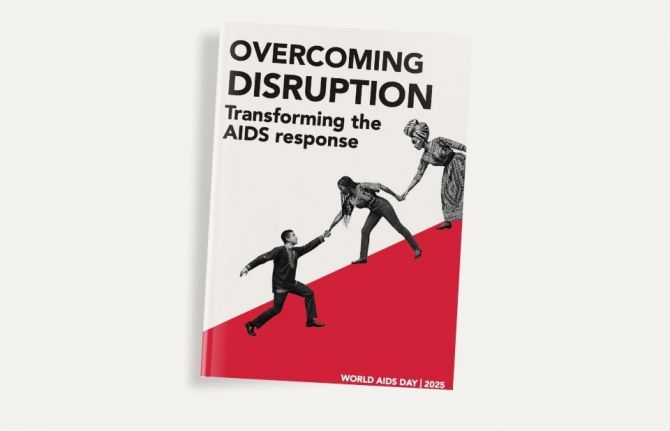
Media Advisory
Launch of UNAIDS World AIDS Day Report 2025
21 November 2025 21 November 2025Overcoming disruption, Transforming the AIDS response
This World AIDS Day comes at a moment of profound disruption and uncertainty for the global HIV response. The combination of a deepening funding crisis, growing geopolitical fragmentation, and questions around the future of global HIV coordination has created the most challenging landscape in more than two decades.
Ahead of World AIDS Day on which is commemorated annually on 1 December, UNAIDS is launching a new report on Tuesday 25 November highlighting the impact of the funding cuts and some of measures taken by countries and communities to continue to drive the response forward despite the disruptions.
The HIV response has always been a testament to what humanity can achieve when there is unity. To date, global collective actions have saved millions lives. This progress risks being lost. No country can fight HIV alone. Nine million people are living with HIV and not on treatment (of the 40.8 million) and 1.3 million people were newly infected with HIV in 2024.
WHAT: Press conference to launch the 2025 UNAIDS World AIDS Day report - Overcoming disruption, transforming the AIDS response.
WHEN: Tuesday 25 November, 14:00–14:45 CET / 13:00–13:45 GMT
SPEAKERS:
- Winnie Byanyima, Executive Director, UNAIDS
- Byrone Chingombe, Technical Director, Centre for Sexual Health and HIV/AIDS Research CeSHHAR (from Harare, Zimbabwe)
- Angeli Achrekar, Deputy Executive Director, UNAIDS
WHERE: Palais des Nations, Geneva, Press Conference room
EMBARGOED MATERIALS: Embargoed until 14:00 CET / 13:00 GMT – 25 November
PASSWORD PROTECTED SITE: URL: https://embargo.unaids.org/
Username: Un@ids_WAD
Password: WAD_r3port_2025
FOR INTERNATIONAL MEDIA WHO WOULD LIKE TO JOIN THE PRESS CONFERENCE REMOTELY PLEASE CONTACT:
Charlotte Sector | tel. +41 79 500 8617 | sectorc@unaids.org
Michael Hollingdale | tel. +41 79 500 2119 | hollingdalem@unaids.org
Related resources

Media Advisory
Upcoming launch of new report by Global Council on Inequality, AIDS and Pandemics, showing how inequalities drive current and future pandemics and what leaders need to do to address them
27 October 2025 27 October 2025A new report by the Global Council on Inequality, AIDS and Pandemics, will be launched on 3 November in Johannesburg - and worldwide online - showing the danger of inequalities that are prolonging current pandemics, such HIV and tuberculosis, and making the world more vulnerable to future pandemics. Read press release
The Council is co-chaired by Nobel prize-winning economist Joe Stiglitz, former First Lady of Namibia Monica Geingos, and Director of the Institute of Health Equity Sir Michael Marmot. It has brought together economists, public health experts and current and former government leaders from around the world.
The launch on 3 November will come ahead of the G20 meetings in South Africa, including the G20 health ministers’ meeting on 6-7 November. The report will also be presented to President Ramaphosa. This year’s G20, chaired by South Africa, has focused its attention on the challenge of inequality.
The report, Breaking the inequality-pandemic cycle – building true health security in a global age, will set out what world leaders need to do to better prepare for future pandemics by reducing inequalities, including addressing the global debt crisis, enabling local research, development and production of new medicines, expanding social protection and supporting communities.
The global event, moderated by Nozipho Mbanjwa-Tshabalala, will be live-streamed by the Mail&Guardian around the world, and will include speakers joining from London, Rio, Madrid, Windhoek, and Kampala, and a studio audience in Johannesburg. It will be immediately followed by a press conference.
WHAT: Launch of the Global Council on Inequality, AIDS and Pandemics report, Breaking the inequality-pandemic cycle – building true health security in a global age. Launch event with interviews of co-chairs and experts from across the world, followed by a press conference and reception.
WHEN: Monday, 3 November 2025, 15:00 South Africa Standard Time
WHERE: Johannesburg, South Africa - and worldwide online
SPEAKERS INCLUDE:
- Winnie Byanyima, Executive Director of UNAIDS and Under-Secretary-General of the United Nations
- Michael Marmot, Institute of Health Equity at University College London
- Joseph Stiglitz, Nobel prize-winning economist
- Monica Geingos, Executive Chairperson, One Economy Foundation and former First Lady of Namibia
- Aaron Motsoaledi, Minister of Health, South Africa
- Nísia Trindade, Former Minister of Health, Brazil
- Javier Padilla Bernáldez, Secretary of State for Health, Spain
- Joe Phaahla, Deputy Minister of Health, South Africa
- Richard Lusimbo, Director General of the Key Populations Consortium, Uganda
- Nomonde Ngema, HIV youth activist, South Africa
For media attendance at the launch event and press conference in person or online, and for interviews and access to the embargoed report, please contact:
Robert Shivambu in Johannesburg | tel. +27 83 608 1498 | shivambuh@unaids.org
or Oliver Aplin in London | tel. +44 785 155 2441 | oca10@georgetown.edu
About the Global Council on Inequality, AIDS and Pandemics
The Global Council on Inequality, AIDS and Pandemics is a high-level initiative convened by UNAIDS to confront how inequalities drive pandemics—and how pandemics, in turn, deepen inequality. Announced in June 2023, the Council is co-chaired by Namibia’s former First Lady Monica Geingos, Director of the UCL Institute of Health Equity Professor Sir Michael Marmot, and Nobel laureate Joseph E. Stiglitz. It brings together leaders across economics, public health, human rights and finance to build a policy environment in which inequalities can be addressed so the world can end AIDS and better prepare for and respond to future pandemics.
Breaking the inequality-pandemic cycle: Building true health security — Findings and recommendations of the Global Council

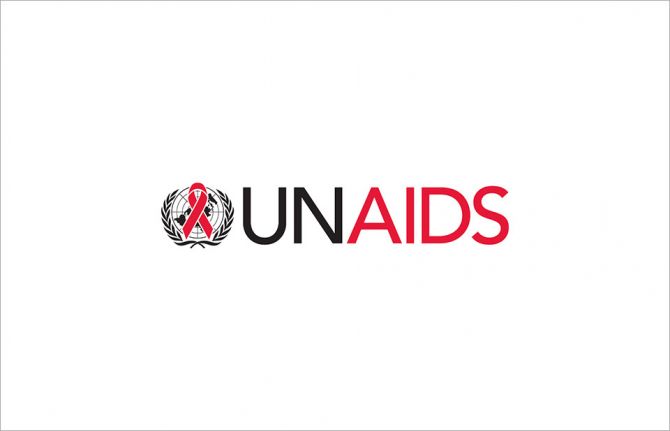
Media Advisory
Launch of UNAIDS Global AIDS Update 2025
01 July 2025 01 July 2025New HIV infections have been reduced by 40% since 2010, and 4.4 million children have been protected from acquiring HIV since 2000. More than 26 million lives have been saved. The response to HIV is one of the most successful public health interventions in history.
However, this phenomenal progress risks being reversed. Sudden, drastic cuts from a number of donors have sent shockwaves through global health. UNAIDS’ new report, AIDS, Crisis and the Power to Transform, shows the impact the cuts are having globally. UNAIDS estimates that if the world does not act, there could be an additional 6 million new HIV infections and 4 million AIDS-related deaths by 2029.
The report highlights the measures some countries are taking to fill the gaps and sustain the response into the future. However, for many, that future remains uncertain.
The HIV response was forged in crisis–and was built to be resilient. Communities, governments, and the United Nations are all transforming to meet this moment and deliver on the promise of ending AIDS as a public health threat by 2030.
WHAT: Launch of UNAIDS Global AIDS Update - AIDS, Crisis and the Power to Transform in partnership with the South African National AIDS Council (SANAC)
WHEN: Thursday, 10 July 2025
TIME: 11:30-12:30 Central African Time and CEST / 09:30-10:30 GMT
WHERE: Bertha Gxowa Hospital, Angus St, Germiston, Johannesburg, South Africa
SPEAKERS:
- Winnie Byanyima, Executive Director of UNAIDS and Under-Secretary-General of the United Nations
- Aaron Motsoaledi, Minister of Health of South Africa
- Helen Rees, Executive Director, Wits RHI
- Mbulelo Dyasi, Executive Director of SANARELA (South African Network of Religious Leaders Living with or Personally Affected by HIV & AIDS)
Watch livestream on 10 July via zoom
For access to the embargoed report or interviews please contact:
UNAIDS Communications
Charlotte Sector | tel. +41 79 500 8617 | sectorc@unaids.org
Michael Hollingdale | tel. +41 79 500 2119 | hollingdalem@unaids.org
UNAIDS
The Joint United Nations Programme on HIV/AIDS (UNAIDS) leads and inspires the world to achieve its shared vision of zero new HIV infections, zero discrimination and zero AIDS-related deaths. UNAIDS unites the efforts of 11 UN organizations—UNHCR, UNICEF, WFP, UNDP, UNFPA, UNODC, UN Women, ILO, UNESCO, WHO and the World Bank—and works closely with global and national partners towards ending the AIDS epidemic by 2030 as part of the Sustainable Development Goals. Learn more at unaids.org and connect with us on Facebook, Twitter, Instagram and YouTube.
Contact
Charlotte Sectortel. +41 79 500 8617
sectorc@unaids.org
Michael Hollingdale
tel. +41 79 500 2119
hollingdalem@unaids.org

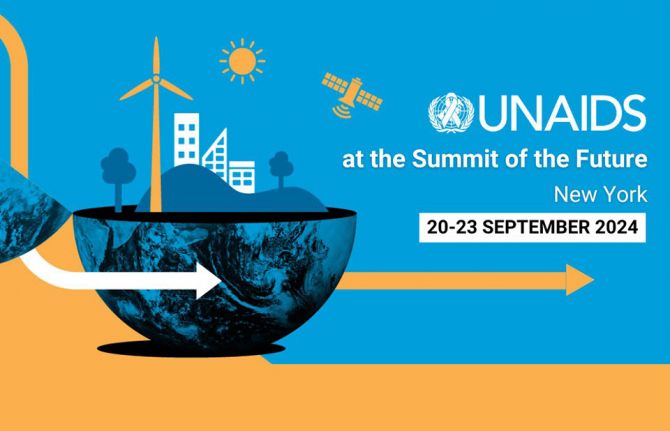
Media Advisory
At UNGA79 UNAIDS will call on global leaders to roll-out new, breakthrough medicines which are nearly 100% effective in preventing HIV and show that at this moment of global crisis the AIDS response proves what’s possible when leaders work boldly together
20 September 2024 20 September 2024The Executive Director of UNAIDS, Winnie Byanyima, is leading the UNAIDS delegation at The Summit of the Future and the 79th United Nations General Assembly in New York to urge world leaders to make new HIV prevention technologies available to people at risk of HIV infection and revitalize multilateralism in responding to global crises.
Lenacapavir, a new injectable medicine administered once every six months has shown in trials to be nearly 100% effective in preventing HIV with trials having been halted early due to the effectiveness of the new medicine. The medicine could be a game-changer for people most at risk of HIV but only if the technology is available and affordable in countries and populations most affected by HIV.
She will be calling on world leaders to revitalise multilateralism, with people at the centre, to respect human rights, solve the debt crisis to give countries the fiscal space to invest in health and other essential services, and allow communities and young people to lead and shape effective policies and programmes to end AIDS by 2030.
Ms Byanyima will be at #UNGA79 with two young HIV activists, Ibanomonde Ngema from South Africa and Jerop Limo from Kenya who will urge leaders to invest in youth-friendly health systems, to provide holistic services for young people living with HIV, and to partner with young people and communities, allowing them to lead in the response to HIV.
A special event convened by UNAIDS, the U.S. President’s Emergency Plan for AIDS Relief and the Global Fund to Fight AIDS, TB and Malaria on September 24 will celebrate the achievements of the global AIDS movement, using the global HIV response as a model of hope, global solidarity and multilateralism to renew commitments, both political and financial, to end AIDS by 2030 and secure progress in achieving the SDG’s.
Alongside Ms Byanyima, participants will include HE William Samoei Ruto, President of the Republic of Kenya, HE Tiémoko Meyliet Koné, Vice President of Cote d’Ivoire and HE Russell Dlamini, Prime Minister of Eswatini (see media advisory below for more details).
Ms Byanyima, Ms Ngema and Ms Limo are available for interviews.
UNAIDS
The Joint United Nations Programme on HIV/AIDS (UNAIDS) leads and inspires the world to achieve its shared vision of zero new HIV infections, zero discrimination and zero AIDS-related deaths. UNAIDS unites the efforts of 11 UN organizations—UNHCR, UNICEF, WFP, UNDP, UNFPA, UNODC, UN Women, ILO, UNESCO, WHO and the World Bank—and works closely with global and national partners towards ending the AIDS epidemic by 2030 as part of the Sustainable Development Goals. Learn more at unaids.org and connect with us on Facebook, Twitter, Instagram and YouTube.
Contact
UNAIDSSophie Barton-Knott
tel. +41 79 514 68 96
bartonknotts@unaids.org
UNAIDS Communications
communications@unaids.org
Newsletter: UNAIDS — on our way to the 79th UN General Assembly
Press Release (including all new data on HIV)

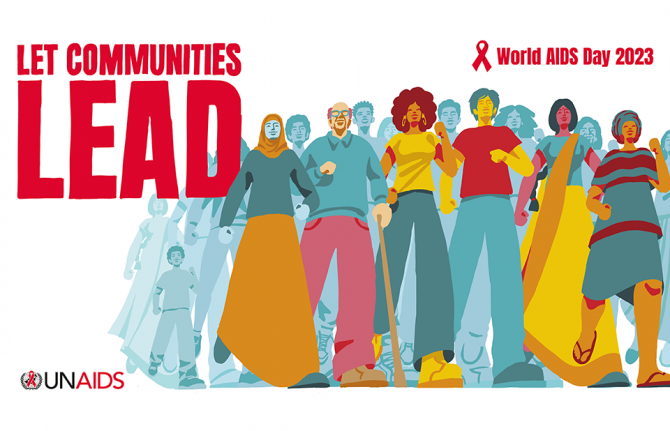
Media Advisory
To end AIDS, Let Communities Lead!
20 November 2023 20 November 2023Media are invited to attend the launch of a new report by UNAIDS which shows that the world can end AIDS if communities are included, funded and supported to lead the way.
Much of the progress made against the HIV pandemic over the last 40 years is thanks to the efforts of community-based organizations. However, the new UNAIDS World AIDS Day report - Let Communities Lead - reveals how communities working to end AIDS are too often unrecognized, under-resourced and in some places even under attack. It outlines how, by removing these obstacles, the full potential of community leadership will be unleashed, allowing the world to end AIDS by 2030.
The press conference will be held in London on 28 November during a World AIDS Day conference hosted by the UK civil society organization STOPAIDS.
WHAT: Launch of UNAIDS World AIDS Day Report: Let Communities Lead
WHEN: 13:30-14:30 GMT, Tuesday 28 November 2023
WHERE: Central Hall Westminster (Mathew Parker Street West entrance), London, UK
WHO:
- Winnie Byanyima, Executive Director of UNAIDS
- Mercy Shibemba MBE, a young, UK-based, award-winning advocate for people living with HIV
- Andrew Mitchell, UK Minister of State for Development and Africa
- Solange Baptiste, Community health and social justice activist, and Executive Director of the International Treatment Preparedness Coalition (ITPC)
- Robbie Lawlor, HIV and access to medicines activist, podcast host and PhD candidate (Moderator)
To attend in person: Media can register here (please select ‘Media’ when registering).
UNAIDS
The Joint United Nations Programme on HIV/AIDS (UNAIDS) leads and inspires the world to achieve its shared vision of zero new HIV infections, zero discrimination and zero AIDS-related deaths. UNAIDS unites the efforts of 11 UN organizations—UNHCR, UNICEF, WFP, UNDP, UNFPA, UNODC, UN Women, ILO, UNESCO, WHO and the World Bank—and works closely with global and national partners towards ending the AIDS epidemic by 2030 as part of the Sustainable Development Goals. Learn more at unaids.org and connect with us on Facebook, Twitter, Instagram and YouTube.
Contact
UNAIDS GenevaSophie Barton Knott
tel. +41 79 514 6896
bartonknotts@unaids.org
UNAIDS Media
communications@unaids.org
Watch the launch

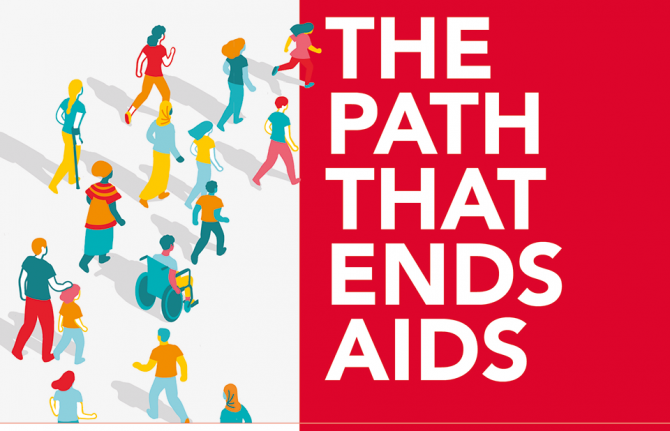
Media Advisory
Launch of UNAIDS Global AIDS Update 2023
20 June 2023 20 June 2023UNAIDS announces that despite the many challenges there is a path that ends AIDS. In its new report The Path That Ends AIDS, UNAIDS demonstrates that there are a growing number of countries that are proving that AIDS can be ended if there is political will.
Political will means delivering on: reliable and adequate funding; following the data and evidence; reducing the inequalities and discrimination that deny people services, using scientific tools that protect well-being, and the essential element of recognizing and engaging community-led interventions.
The Path That Ends AIDS highlights some enormous disparities. Where political commitments have taken an inclusive, human rights-based approach to support people living with and affected by HIV, there is remarkable progress in reducing new HIV infections and AIDS related deaths. Yet when leaders ignore, isolate and criminalize people living with or at risk of HIV, progress in the AIDS response is obstructed. more and more people are becoming infected with HIV.
At this press conference you will hear from a civil society leader living with HIV about the epidemic in Asia. You will hear from the former minister of health of Botswana. You will hear from the former President of the Swiss Confederation about the importance of political leadership and of progressive measures in support of marginalized people at risk of HIV. And you will hear from the Executive Director of UNAIDS who is leading the quest to end AIDS by 2030.
WHAT: Press conference to launch the 2023 UNAIDS Global AIDS Update, The Path That Ends AIDS
WHEN: Thursday, 13th July, 14:00–15:00 CET / 12:00-13:00 GMT
SPEAKERS:
- Ms Winnie Byanyima, Executive Director of UNAIDS
- Mr Harry Prabowo, Asia Pacific Network of People Living with HIV
- Ms Ruth Dreifuss, Former President of the Swiss confederation
- Ms Sheila Tlou, Co-Chair of the Global HIV Prevention Coalition, and former Minister of Health of Botswana
WHERE: Palais des Nations, Geneva, Room B-128
FOR VIRTUAL ACCESS AND INTERVIEW REQUESTS PLEASE CONTACT:
Michael Hollingdale | tel. +41 79 500 2119 | hollingdalem@unaids.org
Sophie Barton-Knott | tel. +41 79 514 6896 | bartonknotts@unaids.org
UNAIDS
The Joint United Nations Programme on HIV/AIDS (UNAIDS) leads and inspires the world to achieve its shared vision of zero new HIV infections, zero discrimination and zero AIDS-related deaths. UNAIDS unites the efforts of 11 UN organizations—UNHCR, UNICEF, WFP, UNDP, UNFPA, UNODC, UN Women, ILO, UNESCO, WHO and the World Bank—and works closely with global and national partners towards ending the AIDS epidemic by 2030 as part of the Sustainable Development Goals. Learn more at unaids.org and connect with us on Facebook, Twitter, Instagram and YouTube.
Watch live

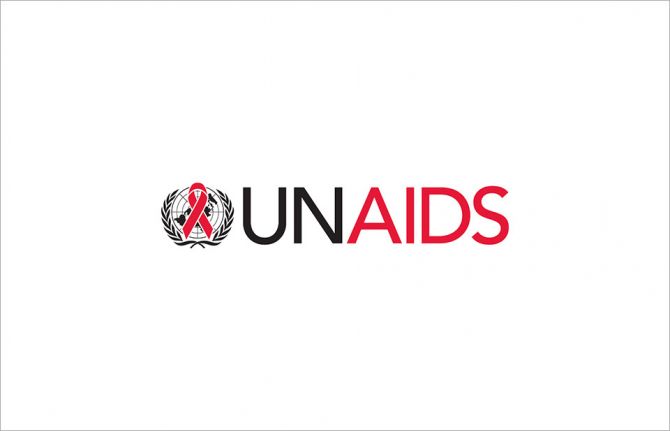
Media Advisory
Dangerous Inequalities: Global launch of UNAIDS World AIDS Day report
25 November 2022 25 November 2022UNAIDS World AIDS Day report 2022 will be launched on Tuesday, 29th November in Dar Es Salaam, Tanzania, during UNAIDS Executive Director's visit to the country. The report is called ‘Dangerous Inequalities’ and reveals that inequalities are obstructing the end of AIDS. On current trends the world will not meet agreed global targets on AIDS. Millions of lives are at stake. The new UNAIDS report shows that only urgent action to tackle inequalities can get the world's AIDS response on track. It shows how world leaders can tackle those inequalities, and calls on them to be courageous in doing so.
WHAT:
Press conference to launch: Dangerous Inequalities, the UNAIDS World AIDS Day report 2022
WHEN:
Tuesday, 29th November. 8:30am-9:30am GMT
SPEAKERS:
- Ms Winnie Byanyima, Executive Director of UNAIDS
- Ms Leticia Mourice Kapela, Chairperson, National Council of People Living with HIV (NACOPHA), Tanzania, Civil Society Leader
- Senior government representative, (to be announced shortly)
WATCH LIVE ON 29 NOVEMBER 8:30AM GMT:
UNAIDS
The Joint United Nations Programme on HIV/AIDS (UNAIDS) leads and inspires the world to achieve its shared vision of zero new HIV infections, zero discrimination and zero AIDS-related deaths. UNAIDS unites the efforts of 11 UN organizations—UNHCR, UNICEF, WFP, UNDP, UNFPA, UNODC, UN Women, ILO, UNESCO, WHO and the World Bank—and works closely with global and national partners towards ending the AIDS epidemic by 2030 as part of the Sustainable Development Goals. Learn more at unaids.org and connect with us on Facebook, Twitter, Instagram and YouTube.
FOR INTERVIEW REQUESTS PLEASE CONTACT:
UNAIDS Geneva
Sophie Barton-Knott
tel. +41 79 514 6896
bartonknotts@unaids.org
WATCH LIVE ON 29 NOVEMBER 8:30AM GMT

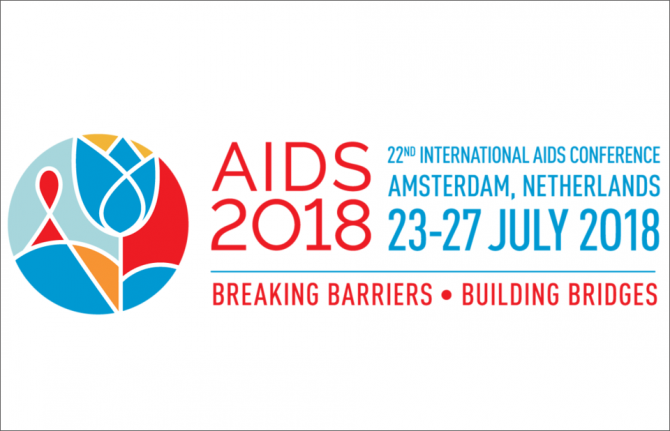
Media Advisory
UNAIDS at AIDS2018
20 July 2018 20 July 2018Key events UNAIDS is leading, co-organizing or participating in at AIDS2018
Sustainable AIDS response
Results in the era of shrinking donor funding
Friday 20 & Saturday 21 July
This pre-conference is one of the only dedicated global events that convenes economists and health and AIDS response policy makers to focus on accelerating progress in countries towards sustainable financing of the HIV response. It provides a strategic platform where economists engage with a wide range of stakeholders on new economic evidence to encourage cross-country learning of novel research findings. Participants will identify strategic emerging issues related to the economics of the HIV response and key policy issues that will require further research to ensure sustainable AIDS response results.
Speakers: Stefano Bertozzi, Berkeley, School of Public Health; Julio Frenk, Harvard School of Public Health; Mead Over, Center for Global Development; Charles Gilks, School of Public Health, University of Queensland; David Wilson, the World Bank.
Venue: Academic Medical Centre, Joep Lange Institute
Organisers: The International AIDS Economics Network (IAEN), UNAIDS, Avenir Health, Bill & Melinda Gates Foundation and the World Bank
UNAIDS contact: Iris Semini / seminii@unaids.org
Sexual and reproductive health and rights pre-conference: Breaking barriers, building bridges for the right to decide
Saturday 21 July 2018
08:30-17:00
Poor sexual and reproductive health and rights (SRHR) and HIV share common root causes, and yet, the respective responses to HIV and to SRHR remain largely unaligned, uncoordinated, and under-resourced. The Sustainable Development Goals (SDGs) are an important opportunity to advance an integrated SRHR and HIV agenda by recognising the importance of universal SRH for achieving health (SDG 3), however, there are significant gaps. With growing conservatism to gender and human rights-based policies, including the global gag rule, now more than ever there is a need for joint action by governments and communities, civil society, international organisations and researchers supporting a strong response to address HIV and SRHR.
Speakers: Alvaro Bermejo, the International Planned Parenthood Federation (IPPF); Lilianne Ploumen, Labour Party, Netherlands; L'Orangelis Thomas Negrón, GNP+
Venue: E103
Organisers: IPPF, AIDS Fonds, UNAIDS, WHO, Dance for Life HIV/AIDS Alliance, Guttmacher Institute, Rutgers
UNAIDS contact: Hege Wagan / waganh@unaids.org
Successfully tackling the structural drivers of HIV
Saturday 21 July 2018
09:30-17:00
Policy makers, implementers, civil society advocates and researchers, will lead two panel discussions on ways to tackle structural drivers that impact on the SDGs in order to achieve multiple benefits; and on the delivery of biomedical prevention technologies including PrEP. The impact on the sexual health of adolescent girls and young women will be a specific focus of both panel discussions. Themes related to HIV risk will include addressing alcohol, gender inequality, social norms, intimate partner violence, stigma and transactional sex.
Co-chairs: Gafos Mitzy, UK Medical Research Council; Kapiga Saidi, London School of Hygine and Tropical Medicine
Opening remarks: UNAIDS
Organisers: STRIVE partners in collaboration with DFID, UNAIDS, UNDP and SRHR Africa Trust
UNAIDS contact: Hege Wagan / waganh@unaids.org
90-90-90 Targets Workshop
Saturday 21 & Sunday 22 July
The 90-90-90 Targets Workshop will examine barriers, challenges and opportunities to attain the UNAIDS 90-90-90 targets by 2020:
- 90% of people living with HIV knowing their HIV status
- 90% of people living with HIV who know their status are on antiretroviral therapy
- 90% of people living with HIV on ART achieving viral suppression
The 2018 Workshop will also focus on the 10-10-10, the people who are being left behind and who must be linked to health systems to access stigma-free HIV testing, prevention, care, treatment and support services.
Speakers: Michel Sidibé, UNAIDS; José M. Zuniga, International Association of Providers of AIDS Care (IAPAC); Kevin Osborne, International AIDS Society (IAS); Ambassador Deborah L. Birx, The United States President's Emergency Plan For AIDS Relief(PEPFAR); Peter Sands, the Global Fund to Fight AIDS, TB and Malaria (Global Fund); Linda-Gail Bekker, Desmond Tutu HIV Centre.
Venue: Elicium Ballroom, RAI Amsterdam Conference Centre
Organisers: IAPAC, UNAIDS, British Columbia Centre for Excellence in HIV/AIDS, GNP+, IAS
UNAIDS contact: Julianna Hills / hillsj@unaids.org
Monday 23 July
Breaking out of our Echo Chambers: Creative storytelling about HIV to cut through the noise
08:00-10:00
How often do you feel you are preaching to the converted? How do we address misconceptions about HIV and tackle stigma with people and audiences that are hard to reach? Learn from storytellers who are breaking out of their ‘echo chambers’ on social media and other media channels to reach audiences that are unexposed to, or misinformed on, issues related to people living with HIV.
Speakers: Jon Cohen, Science; Georgia Arnold, MTV, Makhulu media (Virtual reality team), Reverend Johannes Mokgethi, Mahesh Mahalingam, UNAIDS and others.
Venue: G104-105
Organisers: UNAIDS and ViiV Healthcare, Positive Action
UNAIDS contact: Charlotte Sector / sectorc@unaids.org
Breaking barriers and building bridges toward sustainability of the AIDS response in South-East Asia
Monday 23 July
08:00-10:00
In line with the theme of the 22nd International AIDS Conference (AIDS 2018), “Breaking Barriers, Building Bridges”, the satellite symposium will highlight working models for key populations with focus on approaches from South-East Asian countries including Cambodia, Indonesia, Myanmar, Philippines, Thailand and Viet Nam. These countries have many similarities in their epidemic profile and this session will be a platform in sharing best practices that could be adapted and contextualized in other settings. This satellite session will explore innovations for, and practical solutions to issues related to countries transitioning to middle-income status, and therefore away from traditional sources of donor funding. Each country presenting during the satellite session will be represented by government officials and/or community-based organizations and each will detail innovations in service delivery, and how they have built the strong political commitment required to achieve integrated, inclusive, and sustainable multi-sectoral responses.
Chair: Eamonn Murphy, UNAIDS
Venue: G102-103
Organisers: UNAIDS Asia-Pacific, Government of Indonesia, Government of Myanmar and Government of Thailand (Bangkok Metropolitan Authority).
UNAIDS contact: Aries Valeriano / valerianoa@unaids.org
Condoms 2.0: Reinvigorating effective condom programming in the era of epidemic control
Monday 25 July
08:00-10:00
While HIV prevention has made tremendous strides with voluntary medical male circumcision and pre-exposure prophylaxis, there are still millions of people at risk of infection who cannot use either of these interventions. Condoms remain one of the cheapest and most effective tools for preventing HIV, yet UNAIDS data shows major gaps in condom availability across the world. This satellite will feature speakers from UNAIDS, foundations, donors, countries, affected communities, young people and key populations and implementing partners. It will focus on how to better define the gaps in condom access, funding, targeted subsidy and modernize how we communicate about and offer condoms.
Co-chairs: Mitchell Warren, AVAC and Gina Dallabetta, Bill and Melinda Gates Foundation
Venue: E102
Organisers: PSI, Bill & Melinda Gates Foundation, UNAIDS, UNFPA, AVAC, IPPF, USAID and WHO
UNAIDS contact: Henk Van Renterghem / vanrenterghemh@unaids.org
Catalysing country initiatives and building bridges towards a global compact on stigma and discrimination in healthcare settings
Monday 23 July
10:15-12:15
Thailand is a regional pioneer in development and implementation of innovative system-wide stigma and discrimination responses in health settings. The symposium is an opportunity to learn from Thailand's model on its adaptation of global guidelines and measurement tools to national needs; stigma and discrimination monitoring systems, evidence informed actions at health facilities and community engagement in design and implementation at all levels. Inter-country sharing and south-to-south cooperation will be highlighted. Regional partner Vietnam will present its initiatives and lessons learned from its collaboration with Thailand.
Speakers: Thawat Suntharajarn, Ministry of Public Health, Thailand; Timothy Martineau, UNAIDS; Suwannachai Wattanayingcharoenchai, Department of Disease Control, Ministry of Public Health, Thailand
Venue: Elicium 2
Organisers: Thailand’s Ministry of Public Health, UNAIDS, and US Centres for Disease Control Thailand’s Division of Global HIV/TB
UNAIDS contact: Andrea Boccardi / boccardia@unaids.org
Progressing sexual and reproductive health and rights - HIV linkages advancing towards universal health coverage
Monday 23 July
10:15-12 :15
This high-level panel will examine current progress in linking sexual and reproductive health and rights (SRHR) with HIV–looking at community engagement, policy coordination, systems strengthening and service delivery aspects. The panel will present on a series of underlying principles shaping a renewed Call to Action for continued and expanded focus on SRHR–HIV linkages. Linking SRHR and HIV is an important contributory strategy for reaching SDG 3: "Good health and wellbeing", and associated Target 3.8: "Achieving universal health coverage", particularly for young people, and people living with and affected by HIV. The panel will present national, civil society, donor and development partner perspectives and will highlight how linking HIV with broader SRHR programmes is a key approach for reaching the overarching goal of ending AIDS as a public health threat by 2030.
Co-Chairs: Manjulaa Narasimhan, WHO, Tim Sladden, UNFPA
Venue: E105-108
Organisers: UNFPA, WHO, World Bank, UNAIDS
UNAIDS contact: Luisa Cabal / caball@unaids.org
Ending the AIDS epidemic and achieving universal health coverage by 2030 in Africa
Monday 23 July
10:15-12 :15
This satellite symposium with a panel discussion will focus on the mutual reinforcement of ending the AIDS epidemic and achieving universal health coverage (UHC) in Africa, by reflecting on country experiences from Kenya, Ghana and Rwanda.
According to WHO, UHC means that all people and communities can use the promotive, preventive, curative, rehabilitative and palliative health services they need, of sufficient quality to be effective, while also ensuring that the use of these services does not expose the user to financial hardship. Ensuring universal access to HIV services is critical for the achievement of UHC. HIV is one of the conditions especially important for disadvantaged groups such as women, children, the poor and key populations. As such addressing the HIV epidemic is in pursuit of equity which is inherent in UHC.
UHC has the potential to change the quality of lives of all people in Africa and serves as a critical input for sustainable development. The provision of essential services and interventions, including for HIV, is critical for the achievement of UHC and ending the AIDS epidemic by 2030.
Speakers: Michel Sidibé, UNAIDS; Ren Minghui, WHO; Dr. Rashid Aman, Ministry of Health, Republic of Kenya; Sabin Nsanzimana, Ministry of Health, Republic of Rwanda; Anthony Nsiah-Asare, Director-General, Ghana Health Services, Republic of Ghana; OlayideAkanni, Journalists against AIDS, Nigeria; Peter Sands, the Global Fund; David Stanton, USAID
Moderator: Amb. Mark Dybul, Center for Global Health and Quality, Georgetown University School of Medicine, USA
Venue: Elicium 1
Organisers: UNAIDS, Government of Kenya, WHO, with additional support from the Global Fund
UNAIDS contact: Ani Shakarishvili / shakarishvilia@unaids.org and Jantine Jacobi jacobij@unaids.org
Leadership for HIV primary prevention: The Global HIV Prevention Coalition
Monday 23 July
12:30-14:30
On 10 October 2017, as part of global efforts to end AIDS as a public health threat, UNAIDS, UNFPA and partners launched the Global HIV Prevention Coalition & Road Map 2020, to strengthen and sustain political commitment for HIV primary prevention, and to establish accountability for delivering prevention services at scale. In this session, HIV prevention leaders will make the case for HIV prevention leadership, present progress with road map implementation and towards achieving prevention targets and address sensitive issues regarding required policy change and HIV prevention financing.
Speakers: Michel Sidibé, UNAIDS; Natalia Kanem, UNFPA; Peter Sands, the Global Fund; Aaron Motsoaledi, Ministry of Health, South Africa; Mia Malan, Bhekisisa; Anders Nordström, Ministry of Foreign Affairs, Sweden; Deborah Birx, PEPFAR; Alvaro Bermejo, IPPF
Venue: Elicium 2
Organisers: Global HIV Prevention Coalition
UNAIDS contact: Karl Dehne / dehnek@unaids.org
Eastern Europe and central Asia ministerial policy dialogue
Monday 23 Jul
14:00-16:30
The WHO Regional Office for Europe, in collaboration with the Government of the Netherlands and UNAIDS, will convene a ministerial policy dialogue on HIV and related comorbidities in eastern Europe and central Asia (EECA). The dialogue aims to present the countries pioneering approaches to sustainable, innovative and evidence-based responses to HIV and comorbidities and discuss the opportunities to scale-up. It will also serve to exchange information on sustainable financing and provide a platform to launch a compendium of good practices in the region.
Speakers: Ministers of Health from EECA; Representative of the Government of the Netherlands; Zsuzsanna Jakab, WHO; Vinay Saldanha, UNAIDS; Representative of the European Commission; Representative of the Global Fund to Fight AIDS, Tuberculosis and Malaria, and a representative EECA civil society.
Venue: Mövenpick Hotel, Amsterdam City Centre
Organisers: WHO Regional Office for Europe, the Government of the Netherlands and UNAIDS
UNAIDS contact: Vinay Saldanha / SaldanhaVP@unaids.org
AIDS2018 Opening ceremony
Monday 23 July
19:30 - 20:40
Keynote address: How to face stigma & discrimination - Conchita Wurst, Artist, Austria
Speakers: Michel Sidibé Executive Director, UNAIDS
Venue: Hall 12
Organisers: IAS
Political resistance to addressing the needs of key populations
Tuesday 24 July
11:00-12:30
In many countries, human rights and health needs of key and vulnerable populations are still not addressed or are not addressed at scale. This severely hampers access to information and prevention, is the cause of late diagnosis and limits access to treatment. The challenge is more of a political nature than financial or programmatic.
Speakers: Michel Sidibé, UNAIDS; Sigrun Møgedal, Norwegian Institute of Public Health; Mila Carovska, Ministry of Labour and Social Policy, Macedonia; Daouda Diouf, ENDA Tiers Monde; Jonathan Cohen, Open Society Foundations; Ruth Dreifuss, the Global Commission on Drug Policy
Venue: Auditorium
Organisers: AIDS2018 Community and Leadership Programme Committee session
UNAIDS contact: Chris Mallouris / mallourisc@unaids.org
The catch-up plan in West and Central Africa: Lessons learned and way forward to ensure the accelerated scale up of ART
Tuesday 24 July
12:30-14:15
While global progress in scaling up HIV testing and treatment programmes continues, West and Central Africa (WCA) risks being left behind. Over the last decade, data reported annually by UNAIDS has consistently found that coverage for antiretroviral therapy (ART) and progress in reducing new HIV infections lags behind in WCA. At this session key obstacles, including the imminent threat of a major funding shortfall for the regional response, will be explored. By reviewing gains, challenges and new momentum in the response, key stakeholders can agree on a way forward to achieve the ambitious catch-up aims and to lay the foundation to end the region’s AIDS epidemic.
Speakers: Michel Sidibé, UNAIDS; Stephanie Seydoux, Ambassador for Global Health, France; Deborah Birx, PEPFAR
Venue: UNAIDS room 1
Organisers: UNAIDS
UNAIDS contact: Catherine Bilger / bilgerc@unaids.org
Implementing the SDG agenda to leave no one behind: Innovations in Europe on the Fast Track to ending AIDS
Tuesday 24 July
14:30 - 16:00
Today the HIV, TB and syphilis epidemics continue to rise especially among key populations in Eastern Europe and in parts of southern Europe and it will be critical to continue to work to address this. All over Europe, political will is needed to overcome policy and legal barriers that still hinder access to services by key populations. This session will be an opportunity to bring together some innovations and best practices and discuss what can be learnt from the work of individual member states today to inform the directions of future work.
Co-chairs: Michel Sidibé, UNAIDS; Esther Dixon-Williams, the European AIDS Treatment Group
Speakers: Vytenis Andriukaitis, European Commission; Agnes Buzyn, Minister of Solidarity and Health, France; Zbigniew Król, Vice-Minister of Health, Poland; Sabine Weiss, Vice Minister of Health, Germany; Ferenc Bagyinszky, NGO Delegation to the UNAIDS PCB; Germany; Marc Biot, Médecins Sans Frontières; Jose Manshaden, Amsterdam City; Ricardo Leite, Parliament of Portugal; Dorthe Raben, Centre of Excellence for Health, Immunity and Infections, Denmark
Venue: Hall 12
Organisers: AIDS 2018 Conference Coordinating Committee
UNAIDS contact: Anneclaire Guichard / guicharda@unaids.org
Innovation and impact: Tipping the scale for adolescent girls and young women
Tuesday 24 July
18:30-20:30
Adolescent girls and young women are some of the most disproportionately affected by HIV: every week, approximately 7700 girls and women aged 15-24 acquire HIV however they remain marginalised and difficult to reach. Child marriage, lack of educational opportunities, limited access to SRHR, and gender-based violence are some of the ordeals faced by girls that can make them vulnerable to HIV. To best address girls’ needs we must tackle the structural drivers behind both HIV and child marriage. We need a comprehensive approach that challenges gender inequality and harmful social norms, and seeks to keep girls healthy, safe, and in-school. This interactive session brings together a range of leaders to discuss what is working and how we can accelerate our efforts. They will explore how using cross-sectoral approaches to tackle HIV and child marriage can lead to a brighter future for girls and young women everywhere.
Chair: Mabel van Oranje, Girls Not Brides, Netherlands
Venue: Forum
Organisers: Girls Not Brides: The Global Partnership to End Child Marriage; The Government of the Netherlands; UNAIDS, The Global Fund to Fight AIDS, Tuberculosis and Malaria
UNAIDS contact: Kreena Govender / govenderk@unaids.org
Kenya: Leadership and innovation for results in eMTCT and adolescent care
Tuesday 24 July
18:30-20:30
This symposium seeks to highlight the pathways and partnership needed for ending new infections among children and ensure children grow up AIDS free. It also seeks to foster an understanding of the complexities of a sustainable mother to child transmission and paediatric HIV response as an endeavor that requires continuous investment and effort every single day.
The symposium will use the example of Kenya to promote a discussion about how to address inequity and reach people left behind.
Speakers: Michel Sidibé, UNAIDS; Margaret Gakuo Kenyatta, First Lady of the Republic of Kenya; Deborah Birx, PEPFAR; Charles Lyons, Elizabeth Glazer Pediatric AIDS Foundation
Venue: E105-108
Organizer: UNAIDS
UNAIDS contact: Jantine Jacobi / jacobij@unaids.org
“From Invisibility to Indivisibility” - Strengthening the impact of civil society and community led networks in the HIV response through the Robert Carr Fund
Tuesday 24 July
18:30-20:30
The Robert Car Fund (RCF) is the first international pooled funding mechanism that specifically aims to strengthen global and regional HIV civil society and community networks across the world. This focus is in recognition of networks’ critical value and contribution to better health, inclusion and social wellbeing of inadequately served populations (ISPs) , given their unique reach into and impact at community level.
Over the last five years, the RCF has served a unique role in mobilizing and disseminating pooled resources for global and regional civil society actions with country impact.
This satellite event and reception will celebrate and showcase the work and impact of civil society and community led networks in the HIV response.
Speakers: Alistair Burt, Minister of State at the UK Department for International Development; Kees van Baar, Ministry of Foreign Affairs, the Netherlands; Anne Skjelmerud, Norwegian Agency for Development Cooperation; Sandra Thurman, Office of the U.S. Global AIDS Coordinator and Health Diplomacy; Johnny Tohme, M-Pact (previously MSMGF); Baby Rivona, National Coordinator of Indonesia Positive Women Network (IPPI); Mr Peter Carr
Venue: RAI Amsterdam
Organisers: Robert Carr Networks Fund; UNAIDS as co-organizer
UNAIDS contact: Chris Mallouris / mallourisc@unaids.org
#UPROOT: A youth-led political agenda to end AIDS by 2030
Tuesday 24 July
18:30-20:00
Young people are still being left behind the HIV response. To end AIDS, we must tackle the root causes that put them at risk, including inequalities, discrimination, exclusion and violence. #UPROOT is a youth-led political agenda led by The PACT, a coalition of more than 80 youth organizations working on HIV, to tackle these root causes by challenging harmful laws and policies, supporting youth participation and building partnership. The AIDS2018 Conference will mark one year since #UPROOT was launched, and youth advocates will share their progress thus far with this agenda, providing resources to young people to take it forward everywhere.
Speakers: Youth advocates from The PACT, the Adolescent Treatment Coalition (ATC), IPPF, the Global Network of Young People Living with HIV (Y+), Youth Voices Count and the International Federation of Medical Students Associations (IFMSA), and Ruben Pages from UNAIDS.
Venue: UNAIDS Meeting Room 1
Organisers: The PACT and UNAIDS
UNAIDS contact: Ruben Pages / pagesr@unaids.org
Epidemic transition: How will we achieve it while ensuring equity and quality?
Wednesday 25 July
11:00-12:30
The terms “epidemic control” and “epidemic transition” are being used more often as countries work to meet the global commitment to end AIDS as a public health threat by 2030. Stakeholders working on ways to measure control and transition came together in Glion, Switzerland, in October 2017 to put forward a new set of metrics for countries’ progress towards the 2030 goal. Achieving this goal means zero new HIV infections, zero discrimination, zero AIDS-related deaths and sustained programmatic support for the millions of people living with HIV. “Transition” or “control”, and the idea of having metrics to measure transition points, raises questions, such as:
- How were these metrics established? What do they mean? How can they be interpreted?
- What does it mean to reach transition?
- Where are countries now on this path?
- How can we measure how well a response includes human rights?
Moderator: Mahesh Mahalingam, UNAIDS
Venue: Forum
Organisers: AIDS 2018 Bridging Session
UNAIDS contact: Chris Mallouris / mallourisc@unaids.org
Press launch of the Expert Consensus Statement on the Science of HIV in the Context of Criminal Law
Wednesday 25 July
14:30-15:15
Press conference to announce the publication of the Expert Consensus Statement on the Science of HIV in the Context of Criminal Law in the Journal of the International AIDS Society which aims to ensure that science informs the application of criminal law in cases related to HIV.
Speakers: Linda-Gail Bekker, AIDS 2018 International Scientific Chair; Peter Godfrey-Faussett, UNAIDS; José Zuniga, IAPAC; Edwin Bernard, HIV Justice Worldwide
Venue: Press Conference Room 2
Organisers: UNAIDS, IAS, IAPAC, HIV Justice Network Organisation
UNAIDS contact: Luisa Cabal / caball@unaids.org
Harm Reduction Funding
Thursday 26 July
10:30-12:00
During AIDS2018 Harm Reduction International will release a new report on the current state of funding for harm reduction in low and middle-income countries. The report shows that donor funding for harm reduction has dropped and that national government investment has not made up the shortfall. Not only does the total available funding match that available in 2007, but it remains a fraction of the US$1.5 billion which UNAIDS estimates is needed annually.
Co-Chairs: Vinay Saldanha, UNAIDS and Robert Carr Network Fund
Venue: UNAIDS Offices
Organisers: Harm Reduction International, UNODC and UNAIDS
UNAIDS contact: Chris Mallouris / mallourisc@unaids.org
UNAIDS
The Joint United Nations Programme on HIV/AIDS (UNAIDS) leads and inspires the world to achieve its shared vision of zero new HIV infections, zero discrimination and zero AIDS-related deaths. UNAIDS unites the efforts of 11 UN organizations—UNHCR, UNICEF, WFP, UNDP, UNFPA, UNODC, UN Women, ILO, UNESCO, WHO and the World Bank—and works closely with global and national partners towards ending the AIDS epidemic by 2030 as part of the Sustainable Development Goals. Learn more at unaids.org and connect with us on Facebook, Twitter, Instagram and YouTube.

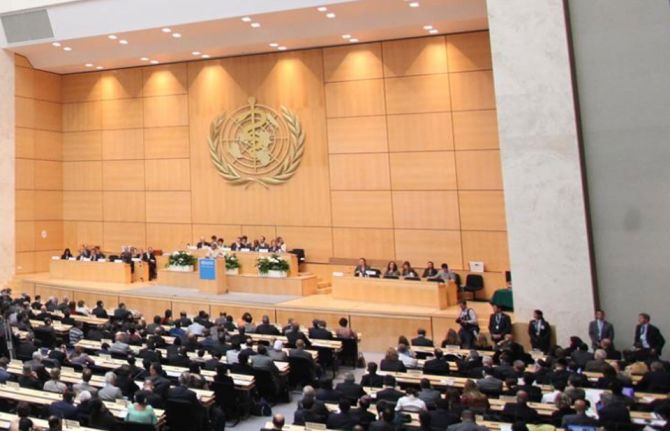
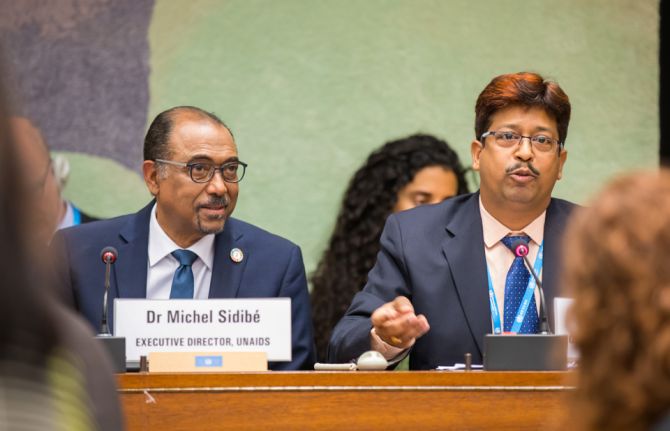
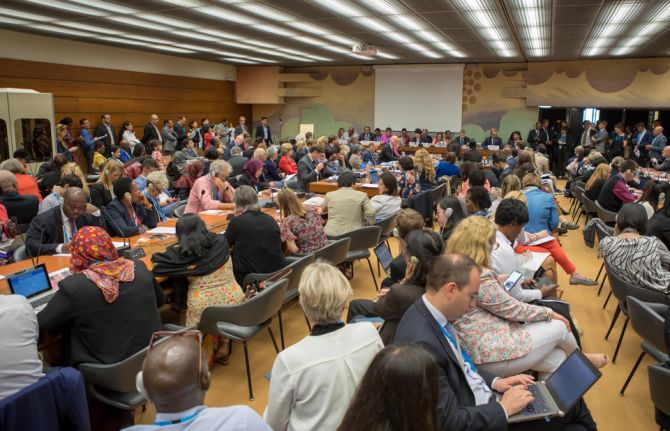
Media Advisory
UNAIDS at the 71st World Health Assembly
23 May 2018 23 May 2018During the 71st World Health Assembly, UNAIDS will be organizing and participating in a number of important events as part of UNAIDS’ continued efforts to strengthen partnerships and advocate for a Fast-Track response to end the AIDS epidemic by 2030.
Below are some of the events that UNAIDS will be engaging in.
Wednesday, 23 May
Event West and central Africa ministerial meeting on addressing the negative impact of user fees on access to AIDS services, increasing inequities and affecting the right to health
Date 23 May 2018, 13:00–14:00
Where TBC
Overview User charges at health facilities impede access to HIV and health services, particularly maternal care and HIV testing and treatment—increasing morbidity and mortality and impoverishing entire households. Vulnerable groups are the most affected and the detrimental effect of user fees is not only slowing progress towards the Fast-Track Targets but more importantly increasing inequities and affecting the right to health. Leadership to mobilize partners and change policies is central to defining the next steps towards identifying country-tailored solutions to move away from user fees.
Speakers
Deborah Birx, United States Global AIDS Coordinator and Special Representative for Global Health Diplomacy
Michel Sidibé, Executive Director of UNAIDS
Peter Sands, Executive Director of the Global Fund to Fight AIDS, Tuberculosis and Malaria
WHO representative
With contributions from the Health Ministers of Burundi, Cameroon, Côte d’Ivoire, the Democratic Republic of Congo and Nigeria
Hosts UNAIDS, PEPFAR, the Global Fund, WHO
Focal points Victor Bampoe | bampoev@unaids.org / Iris Semini | seminii@unaids.org
Thursday, 24 May
Event Economic Community of West African States (ECOWAS) ministerial meeting
Date 24 May 2018, 8:00–9:30
Where UNAIDS, Kofi A. Annan Conference Room
Overview ECOWAS health ministers will come together to strengthen their common understanding of addressing the health needs of the ECOWAS region. Topics under discussion will include: innovative strategies for reducing maternal and child mortality; development of quality standards and charter marks for centres of excellence; medicines and vaccines—regional production and quality; improving the prevention and control of noncommunicable and communicable diseases; and health information.
Host West African Health Organization
Focal points Sylvie Daouda | daoudas@unaids.org / Joy Backory | backoryj@unaids.org
UNAIDS
The Joint United Nations Programme on HIV/AIDS (UNAIDS) leads and inspires the world to achieve its shared vision of zero new HIV infections, zero discrimination and zero AIDS-related deaths. UNAIDS unites the efforts of 11 UN organizations—UNHCR, UNICEF, WFP, UNDP, UNFPA, UNODC, UN Women, ILO, UNESCO, WHO and the World Bank—and works closely with global and national partners towards ending the AIDS epidemic by 2030 as part of the Sustainable Development Goals. Learn more at unaids.org and connect with us on Facebook, Twitter, Instagram and YouTube.
Press centre
Download the printable version (PDF)

